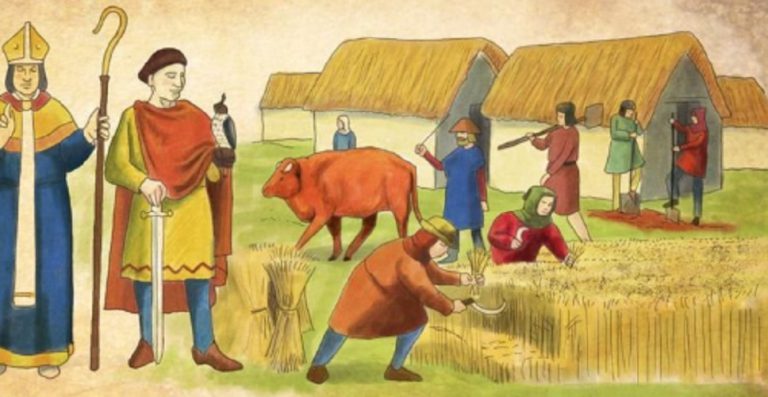Are you ready to be a Serf? Are you still thinking like a slave?
This is nothing new.
In fact, the mother-WEFers are so desperate they are trying to impose ancient ideas on us that have already failed.
I’m talking about Serfdom, that system of restrictions imposed on people nearly a thousand years ago.
I asked Chat GPT to tell us how restricted was the Feudal Serf?
Read this and then ask yourself if this sounds familiar? Isn’t this exactly what the mother-WEFers are trying to impose on us with their 15-minute cities?

During the height of feudal serfdom in England, which lasted from the 11th to the 14th century, the average serf faced significant restrictions and limitations on their personal freedom and mobility. Serfdom was a system of labor in which peasants worked the land belonging to a lord in exchange for protection and the right to live on the estate.
Here are some key aspects of the restrictions faced by serfs:
- Tied to the land: Serfs were legally bound to the land they worked on. They were not allowed to leave the lord’s estate without permission or without fulfilling their obligations. Their status as serfs was hereditary, meaning they were born into serfdom and their children would also be serfs.
- Labor obligations: Serfs had to provide labor services to their lord, typically working several days a week on the lord’s land. They were responsible for cultivating and harvesting crops, maintaining the estate, and performing other tasks as required.
- Restrictions on mobility: Serfs were generally not allowed to move away from the lord’s estate without permission. Their movements were closely monitored, and leaving without consent could be considered a punishable offense.
- Limited economic freedom: Serfs were subject to various economic restrictions. They had to pay certain taxes or dues to their lord, often in the form of a portion of their crops or livestock. They were also required to use specific facilities, such as the lord’s mill or oven, and pay fees for their use.
- Legal subordination: Serfs were subject to the jurisdiction of the lord’s court and did not have the same legal rights as free individuals. Their access to justice and legal protection was limited, and disputes were typically resolved within the manor court, where the lord or his representative acted as the judge.
- Dependence on the lord: Serfs relied on their lord for protection and had to seek permission for major life decisions. They were often obligated to provide military service if the lord called upon them.
It’s important to note that the extent of restrictions could vary depending on the specific region and time period within feudal England. While serfs generally faced limitations on their personal freedom and opportunities for social mobility, the exact conditions and degrees of severity varied across different manors and lords.

How far could the serf wander before he was in trouble?
The extent to which a serf could wander without getting into trouble varied depending on the specific time period and the laws or customs of the region they lived in. Serfs were peasants who were bound to the land and obligated to work for the lord of the manor. Their movements and freedoms were typically restricted, and they were expected to remain within the boundaries of the estate or manor where they were assigned to work.
In feudal societies, serfs were tied to the land and their obligations to the lord. They were not allowed to leave the manor without permission from their lord, as their labor and services were crucial for the functioning of the feudal system. Leaving the manor without authorization could be seen as a breach of their feudal duties, and they could face punishment or be brought back forcefully.
However, the specific rules and restrictions on serf movement varied across different regions and historical periods. In some cases, serfs might be allowed limited freedom of movement within the immediate vicinity of the manor, such as to visit neighboring villages or attend local markets. In other cases, their movements might be more strictly controlled, and leaving the manor without permission could be severely punished.
It’s important to note that serfdom was a complex institution with regional variations, and the exact limitations on a serf’s movements would depend on the specific feudal system and the social, economic, and legal conditions of the time and place.
Now Translate this to the 15-Minute City the mother-WEFers are trying to force on us.
You will not be allowed to travel outside the 15-minute restricted area without permission. Any attempt to leave without permission will be fined. And you won’t even be able to challenge the fine because they will take it directly from your Social Credit account…. controlled by the Central Bank Digital Currency (CBDC) they are setting up right now here in Australia, and around the world.

How can we stop this?
The answer is simple. We must unite, and we must disrupt their plans any way we can without breaking the law.




